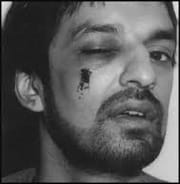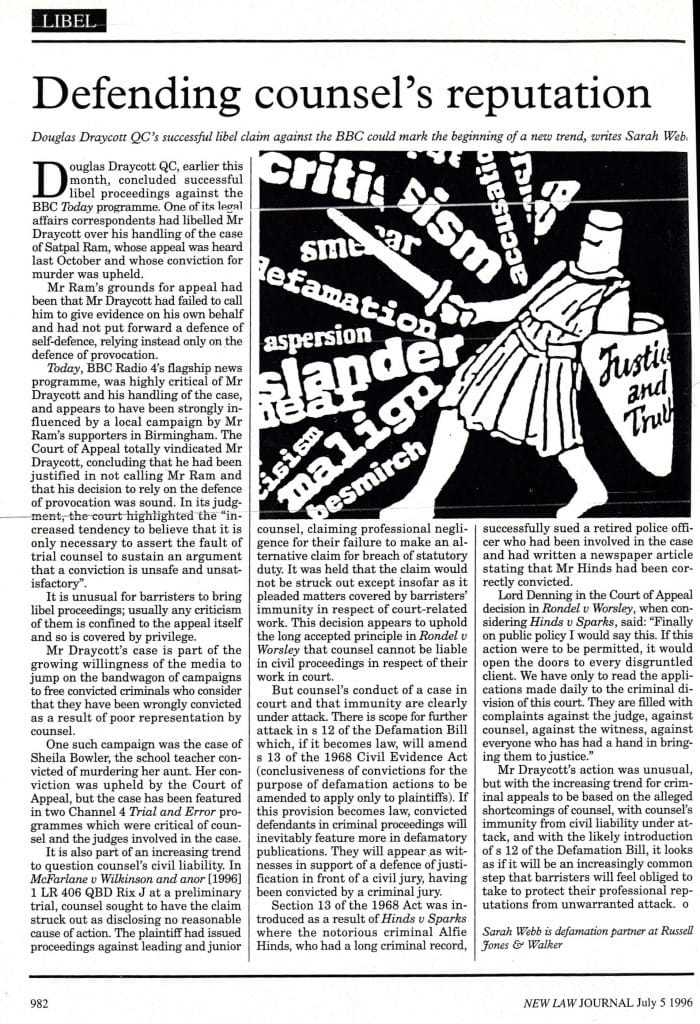November 16 this year fell on a Sunday; so did November 16, 1986. That fact is not significant to most people, but it is to a certain lady in Birmingham because on that fateful day she saw her younger brother stabbed to death in a short but frenzied attack by a drunken thug.

Convicted murderer Satpal Ram
Clarke Pearce was a member of a small party who were dining in the Sky Blue restaurant. It was the small hours of the morning, and for whatever reason, Clarke asked for the background music to be turned down. An Asian diner on another table took exception to this and started an altercation. Satpal Ram had had far too much to drink; he also had a flick knife on his person. In the UK, any kind of flick knife is proscribed by law, so he could not have purchased it legally. Ram would claim later this was a penknife he used in his warehousing job, a claim that was as vacuous as it was self-serving.
It is still not entirely clear what happened next, but it is clear that Clarke was unarmed, and that shortly he was lying on the floor mortally wounded. Ram had been dining with two others; the female of the party dragged him into the toilet and cleaned him up. Somehow he had sustained a small cut to his face. He would claim later that Clarke had attacked him with a glass, but as the victim was taller and heavier than him by some considerable margin, that claim does not fly. Furthermore, the autopsy report, which was released in 2001, shows Clarke was stabbed in the back. This may not be easy to understand for those without medical knowledge, but the Court of Appeal commented on it in both 1989 and 1995.
The above documents can be found on the dedicated website set up about the murder of Clarke Edward Pearce.
When he emerged from the toilet, Ram asked if Clarke was dead, and when told he wasn’t, he cursed and said he soon would be. That prediction came true because Clarke died in Birmingham General Hospital at 4.23 am as Dr Jean McGivern struggled to save his life. Ram did not wait around for the police to arrive but proceeded to another hospital where he was so drunk and abusive that initially he could not be treated. As he left the restaurant he still had the murder weapon in his hand.
After trying to obtain a passport to flee the country, he gave himself up. The police were unimpressed with his incoherent story and charged him with murder. He stood trial at Birmingham Crown Court the following year where he was defended by both Leading Counsel and a Junior. Douglas Draycott is now long dead, but Stephen Linehan is still at the Bar; he took Silk in 1993.
At his trial, Ram was what is called a vulnerable witness; this phrase has several meanings, in his case it meant liar, his story was not credible, and if he took the stand he would be vulnerable in cross-examination. However reluctantly, he accepted the advice of his legal team not to testify and was duly convicted.
Dissatisfied with the verdict, Ram appealed, as was his right. His appeal was rejected at the leave stage. That might have been the end of the matter, but he and his supporters decided to launch a campaign to win his freedom, and they did this by not simply protesting his innocence but by heaping bile and vitriol on his victim. As Clarke was white and Ram is not, he was portrayed as a racist who not only attacked Ram but who by inference deserved what he got. The reality is that whatever mush the Ram campaign put out, it was he rather than Clarke who used a racial epithet, and at Clarke’s funeral, not all the faces were white.
These libels on the living as well as the dead were parroted uncritically by not only the newly emerging online world but by mainstream publications, lawyers and even MPs. The vilest lie was that Clarke rather than Ram was responsible for his death on account of his refusing medical treatment. The reality is that Clarke was in no position to refuse medical treatment, he was at best in a daze. These lies even penetrated the Palace of Westminster in the form of an Early Day Motion.
In prison, Ram decided he was a political prisoner, citing as one of his heroes American cop-killer Mumia Abu-Jamal. The Prison Service was unimpressed, and his behaviour led to his spending long periods in solitary confinement and to his being transferred repeatedly from prison to prison. All the while he was complaining of brutality by his guards – as per the photograph here – yet on one occasion he admitted to throwing a potful of urine at one of them.
Paul Boateng, then Prisons Minister, ignored no less than three letters concerning claims that Ram had been mistreated, one of which was delivered by hand to the House. That silence was as good as a reply.
Mr Ram’s supporters didn’t have it all their way; when they duped BBC Radio into libelling Douglas Draycott, he sued and settled to his satisfaction.
This attack on Draycott was typical of Ram and his supporters; they blamed the victim for their hero’s predicament, the racist police, the trial judge, the jury, his barrister, indeed everyone except the only man responsible, the one who had stabbed a stranger in the back in a drunken frenzy and gloated over him as he lay dying.
Despite the dismissal of his second appeal in a strongly worded judgment, and Home Secretary Jack Straw blocking it, Ram’s supporters continued to press for his release, and they were rewarded, but their joy was short-lived. On September 7, 2001, Ram’s mother died of leukaemia; the same day, the Criminal Cases Review Commission declined to refer his case back to the Court of Appeal. Following a ruling by the European Court of Human Rights in another case the previous month, Ram was paroled from HMP Blantyre House on June 18, 2002, still protesting his innocence and vowing to fight on to clear his name. He even held a press conference, but none of the journalists presents asked any inconvenient questions.
On April 17, 2003, he was set to receive £20,000 compensation for the “extra time” he had spent in prison, but a week later a report was received from the London Probation Service recommending his recall to prison following allegations of assault and criminal damage. As a convicted murderer on life licence, he didn’t need to be convicted of or even charged with any sort of offence. His licence was revoked on May 7, 2003, and he was unlawfully at large. As for that compensation, because he had brought other proceedings about alleged assaults, and these were dropped, the costs were recovered from this money, so the £20,000 dwindled to around a thousand. All the same, he wanted to get his hands on it, and while unlawfully at large his lawyers went to the High Court to attempt to have it paid to his brother.
Naturally, no court would entertain such an application, but it demonstrates the total venality of his lawyers that they would attempt something like this. The application was dismissed on January 12, 2004; on September 3 the previous year, the new Home Secretary David Blunkett had informed Ram’s solicitors that their client could collect a cheque for his outstanding compensation and interest in person from Islington Police Station (where he would, of course, have been arrested).
On April 18, 2005, Ram was re-arrested in London, during which he assaulted two police officers. On July 23, 2013, the sister of his victim was informed that he had been paroled again. This time there was no press conference, nor anything in fact, and it is to be hoped he will live out the rest of his to date worthless life in total anonymity, though there is at least one person in Birmingham who has cause to remember him, the woman who still grieves for her brother every day.

